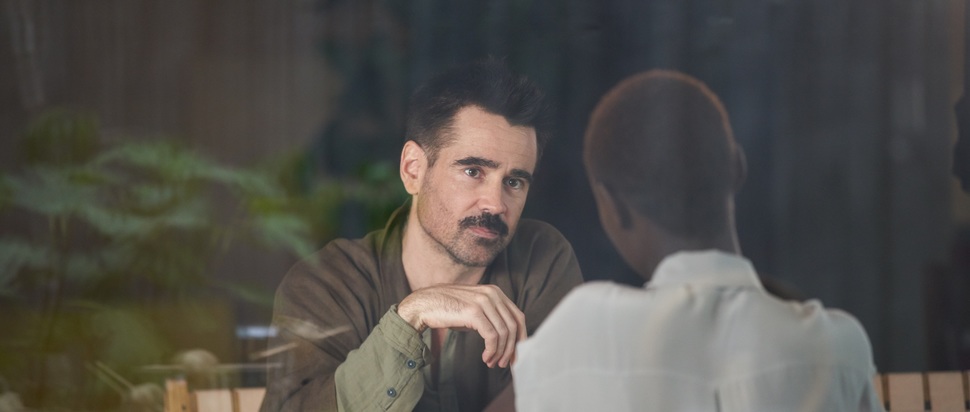Kogonada and Justin H. Min on After Yang
We caught up with director Kogonada and actor Justin H. Min while they were in Edinburgh to help close out the Edinburgh International Film Festival. We talk memory, emotional attachment to technology and bowl haircuts
After Yang, the second feature film from gifted South Korea-born, America-raised filmmaker Kogonada, concerns a family bereavement. But it's not a sickly child, much-loved grandparent or even a beloved pet that shuffles off their mortal coil – it's the death of a 'technosapien' robot helper named Yang. After his passing, the family who owned him slowly start to appreciate not only how attached they were to Yang, but that he was as capable of human affection and connection as them. “We are surrounded by technologies and we, as human beings, become vulnerable to this sort of emotional attachment,” director Kogonada says about the potency of stories about human connection in a world ubiquitous with technology. “It’s about wrestling with another being and the way in which they can get into your own skin.”
After Yang is fixated on memory, and the ways we use it to catch hold of people slipping away – either through objective but emotionless technology, or the beautifully imperfect human mind. We’re shown examples of both in the film; the surprise discovery of Yang’s recorded memory bank shows snapshot glimpses of recordings that, played sequentially with Aska Matsumiya’s delicate piano score, feel precious and powerful – an example of the effectiveness of a well-crafted montage. “When we were talking about even just the way we were going to deal with the future world, I wanted to use the language of cinema more than special effects,” says Kogonada says, “because I think cinema is its own effect, right? And montage is at the core of the DNA of cinema.”
Justin H. Min, who plays Yang, appreciates the way Kogonada’s direction captures these tiny, often silent moments. “He would just give me different notes throughout,” recalls Min. “The one that comes to the top of my mind is just me staring into a mirror. You would think that I would be staring into a mirror for three seconds, they would have cut and they would use that, but we really just got to explore in that space.”
Notably, parents Jake (Colin Farrell) and Kyra (Jodie Turner-Smith) remember Yang in distinctly human ways. Kogonada litters their recalled conversations with multiple takes of the same dialogue, sometimes overlapping, all with subtle differences in expression and intonation. Visualising this difference was paramount to Kogonada. “You can replay Yang's memory, and they're always going to be the same thing,” he explains. “But with human memory, research says it's never like a recording every time you recall it; it will change on you. I think, then, sometimes, a memory can feel sweeter than it actually was. There are moments in that conversation where the parents have sweetened this memory with Yang because they're suddenly feeling this sort of affection. And we can do that and sometimes, God, we need that because, as humans, we need to be more forgiving or more open.”
Min points out this choice wasn’t communicated to the actors on set. “We didn't actually know that was gonna happen, and actually I'm so glad we didn’t know,” he explains. “Had that been in my head as an actor, it would have been very confusing, and I would have been trying to do too much. All I needed to focus on in those scenes was, who am I speaking to, and what's the relationship to this person? So much is the absence of Yang, but I wanted to make sure that for me, as the actor, I felt full in terms of the life that Yang lived and the relationships that he had.”
This fullness of Yang’s character is complicated by what the human characters understand as his identity. Yang is a “cultural techno,” a Chinese robot brought into the family to help bridge gaps between adopted daughter Mika (Malea Emma Tjandrawidjaja) and her non-Asian parents. The fact that Yang’s capacity for human emotions is not assumed, while his ethnicity is crucial, was all part of Kogonada and Min’s exploration of racial identity.
“This was about the construct of Asianness and when I was starting to write it, it felt more relevant than so many of the other Asian identity stories that I've encountered,” Kogonada explains. “Because Yang, if you step back and think, what does it mean for Yang to be Asian, and is he Asian?... In our own lives, I think we wrestle with the expectation and perception of Asianness, and as people have grown up in the west, the Orientalism that we are surrounded by.”
As a Korean-American, Min was integral to the process of not only how Yang should act, but look – including a distinctive bowl-cut hairstyle that ties into how Asian people are viewed from the outside. “That bowl-cut is so iconic in the Asian community and something that Westerners often see when they see us,” says Min. “Even in terms of the costume design, it was all very intentional in terms of this construct of Asian identity.”
The choice clearly weighs heavily on Kogonada’s mind: “He has such great hair…” he muses.
After Yang will be released in cinemas and on Sky Cinema from 22 Sep
